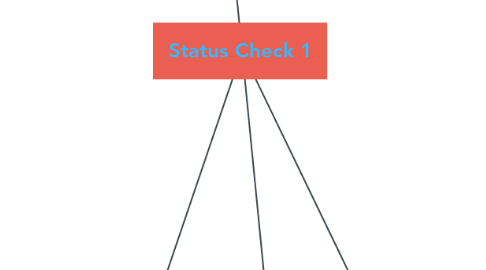
1. Politics of Education
1.1. 1. 4 Purposes of Education
1.1.1. Intellectual
1.1.1.1. The teaching of common skills; reading, writing, and mathematics; relaying in depth knowledge, and helping children with higher-order thinking skills like analysis, evaluation, and synthesis
1.1.2. Political
1.1.2.1. To persuade children into patriotism; to create a new generation that will be active members in the political worldr; helping bring diverse groups togetherr; and to teach the basic laws of the society
1.1.3. Economic
1.1.3.1. Getting students ready for their future career by training and knowledge selection based on this field.
1.1.4. Social
1.1.4.1. Making sure that children are a part of their society in an active way all around. Offers stability within a society. Well rounded individuals.
1.2. Radical Perspective
1.2.1. A) By using social and cultural reproduction the school's role is to give in to society and apply to the wealthy; and prepare children from different economic backgrounds for different roles to be active and employable.
1.2.2. B) Explanations of unequal performance: students from low income areas aren't listed as equals upon the start of education; economics not education systems themselves are to blame for failure in the education setting and if thepolitical-economic structure changes, so can the problems
1.2.3. C) Definition of education problems: 1. The educational system has failed the poor, minorities, and women through classist, racist, sexist, and homophobic policies. 2.Schools preach conformity 3. Traditional curriculums are classist, racist, sexist, and homophobic and also leave out the cultures, histories, and voices of the downtrodden. 4. The educational system promotes inequality of both opportunity and results.
2. History of U.S. Education
2.1. Equality of Opportnity
2.1.1. It is stated that schools can be a "lever of social progress". and are capable of solving problems of inequality. Lawrence Cremin points out the fact that Americans hae expected schools to solve social, political, and economic problems and have put on schools all kinds of hopes and expectations. The GI Bill came about and offered 16 million military men and women an opportunity of education and was described by Ratvich as "the most ambitious venture in mass high education that had ever been attempted by and society". Even with this still came the issue of race. African Americans faced major educational set backs. See the opinion of Justice John Marshall Harlan on page 77. In the 1930s and 1940s the NAACP tackled the educational issues at hand. On May 17, 1954 a victory was made that imposed segregation was unconstitutional. The Separate but equal act was reversed. Brown Vs Topeka Board of Education was a turning point. This also brought about a lot of turmoil and unease that had to be fought.This issue is still presently being handled in some school districts.
2.2. The Democratic-Liberal View
2.2.1. This view believes in progressive evolution. It takes into account the flaws but also the commitment to provide education for those who seek it. Ellwood Cubberly and Curti. Cremin portrays education in 2 process: Popularization and multifariousness. He says that educational history of the US has both expansion of opportunity and purpose. Meaning more students from diverse backgrounds went to school for longer, the goals of education became more diverse, with social goals becoming as or more important than intellectual ones. He also doesn't deny that there are problems and conflicts and discrepancies between this opportunity and the results more so for the disadvantaged, but he ever gave up. Overall optimistic view of education.Compromise is a necessity for equal opportunity to exist. A delicate balance is needed. Their policy and reform include quality with equality, effective research, enhanced opportunities for disadvantaged, a more culturally diverse curriculum, and a balance between performance standards and ensuring students meet them.
3. Sociology of Education
3.1. Functionalism
3.1.1. Concerned with viewing society as a machine where one part articulates with another to make the delicate balance work. Believe that consensus is the normal state in society and that conflict represents a breakdown of shared vales. Educational reform should create structure and curricula and programs that are technically advanced, rational, and encourage social unity.
3.2. Conflict theory
3.2.1. Do not see a relation between school and society as unproblemtic or straightforward. Schools are similar to social battlefields, where students struggle against teachers, teachers against administrators and so on. Achievement ideology disguises the real power relations within the school which then reflects and correspond to power relations within the larger society.Basicaly that it is a constant battle or struggle between authoritative figures.
3.3. Basically play off of conflict and functionalism theories. Says that those two are abstract and emphasize structure and process at a very general level of analysis. (macrosociological)
3.4. Effects of Schooling on Individuals
3.4.1. Knowledge and Attitudes: Education is paralleled with the person's sense of well being and self esteem. Social class and and background can play a large role in the attitude or mindset of students and effect overall education.
3.4.2. Teacher Behavior: the way that teachers portray their students effects the way the learn. Basically speaking higher achievement to life. Teachers perceptions and reactions and expectations of students can lead to better learners and better self esteem.
3.4.3. Inadequate Schools: urban and underfunded schools produce inadequacies in students. Overall effects can even hit the meaningfulness of their diplomas.
3.4.4. De Facto Segregation: racially mixed schools have a higher graduation rate and higher student achievements. Also, decreases chances of being arrested.
